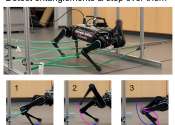Tricky tangles: Robots learn to navigate vine-like vegetation
Robots are often found in very controlled, indoor environments because, unlike in a natural environment, there are no tripping hazards to overcome. However, in order to perform important tasks like environmental monitoring ...
Oct 5, 2023
0
89









